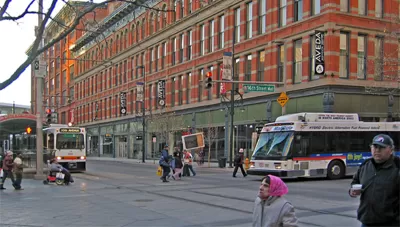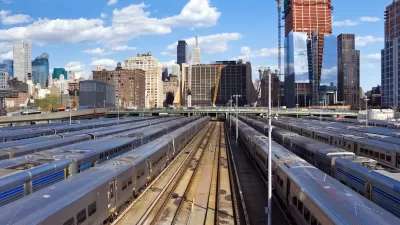Mobility Lab tackles the challenges of building affordable housing near transit (i.e., transit-oriented affordable housing) by providing specific, real-world examples from cities and states.

Michael Ryan argues for a stronger connection between affordable housing and transit:
The term “affordable housing finance” isn’t quite as catchy as “carshare,” “bikeshare,” or any of the other technology improvements helping promote transportation demand management. Yet for low-income members of our communities, who stand to benefit the most from those solutions, affordable housing finance should be considered, and put to use as, a TDM strategy.
After listing a few of the ways that transit reduces the daily costs of mobility for residents, Ryan also notes some of the challenges to building more affordable housing near transit. For one, land values near transit tend to be higher, according to Ryan, "[making] it difficult for affordable housing developers to purchase land in these locations."
Ryan concludes by producing a list of policy ideas designed to help deliver transit-oriented affordable housing. Examples include
- The allocation of Low-Income Housing Tax Credits through the Qualified Allocation Plans created by states for the U.S. Department of Urban Housing and Development. "Massachusetts is one of several states that have incorporated mobility into their QAPs by awarding points based on a project’s proximity to rail or bus," according to Ryan.
- Housing protection districts, such as the Special Affordable Housing Protection District included in the General Land Use Plan of Arlington, Virginia.
- A transit-oriented development fund, such as the Denver Regional Transit-Oriented Development Fund.
FULL STORY: Affordable housing and transit should go hand-in-hand

Maui's Vacation Rental Debate Turns Ugly
Verbal attacks, misinformation campaigns and fistfights plague a high-stakes debate to convert thousands of vacation rentals into long-term housing.

Planetizen Federal Action Tracker
A weekly monitor of how Trump’s orders and actions are impacting planners and planning in America.

In Urban Planning, AI Prompting Could be the New Design Thinking
Creativity has long been key to great urban design. What if we see AI as our new creative partner?

Massachusetts Budget Helps Close MBTA Budget Gap
The budget signed by Gov. Maura Healey includes $470 million in MBTA funding for the next fiscal year.

Milwaukee Launches Vision Zero Plan
Seven years after the city signed its Complete Streets Policy, the city is doubling down on its efforts to eliminate traffic deaths.

Portland Raises Parking Fees to Pay for Street Maintenance
The city is struggling to bridge a massive budget gap at the Bureau of Transportation, which largely depleted its reserves during the Civd-19 pandemic.
Urban Design for Planners 1: Software Tools
This six-course series explores essential urban design concepts using open source software and equips planners with the tools they need to participate fully in the urban design process.
Planning for Universal Design
Learn the tools for implementing Universal Design in planning regulations.
Gallatin County Department of Planning & Community Development
Heyer Gruel & Associates PA
JM Goldson LLC
City of Camden Redevelopment Agency
City of Astoria
Transportation Research & Education Center (TREC) at Portland State University
Jefferson Parish Government
Camden Redevelopment Agency
City of Claremont





























